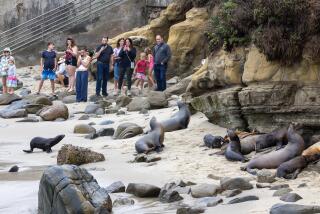Beach Babies : Officials Warn: If You Find a Young Seal, Let It Be
- Share via
Santa Monica animal control officials say they will post signs warning people not to disturb the baby harbor and elephant seals that are appearing on local beaches at this time of year.
The seal pups, between one and three months old, have begun arriving from their birthing grounds on the Channel Islands.
During the next several months, beach-goers may come across pups that have been left temporarily unattended on the beach while their mothers hunt for fish.
That worries animal control officers and wildlife experts, who fear for the welfare of both the baby seals and the humans who approach them.
“It’s a problem, because most people do not know how to treat the animals,” said Don Zumwalt, director of the Marine Mammal Care Center at Fort McArthur in San Pedro.
The nonprofit center takes marine mammals brought by animal control departments from Ventura County to Long Beach.
The pups, which weigh up to 70 pounds, may be sick or injured, but more often they are just resting, he said.
“Don’t pour water on it. Don’t try and feed it. Don’t try and drag it back into the water,” Zumwalt said.
Animal control officers tell of incidents in which people have tried to cover the pups with blankets or towels; one person even attempted to put a sweater on a baby seal.
And some parents, they say, have had their children stand next to a pup for a photograph.
All such behavior not only disturbs the seals but can also endanger humans.
Seal pups have been known to bite intruders--sometimes severely, officials say.
“If you see a pup on the beach, you should report it to the lifeguards or harbor patrol. They’ll take a look and determine whether it needs to be taken off the beach,” said Stan Hernacki, supervisor of Santa Monica’s Animal Control Division.
“Most people don’t understand that seals need to come up and rest. The conception is that (they are) sick. But often they are perfectly fine,” Hernacki said.
Beach-goers often think elephant seals are dead when they find them lying on the beach, Zumwalt said. These seals, which can hold their breath for long periods under water, may breathe only every three or four minutes on land, he said.
When baby seals appear on local beaches, animal control officers watch them and keep crowds away. Usually the mothers leave their babies in the early morning or late evening, when few humans are near, Hernacki said.
If the mother does not return within a reasonable time, or if the pup appears undernourished or dehydrated, officials will step in to help.
“They would not survive if they are left on their own,” Zumwalt said. In the ocean, he explained, weak pups would be easy prey for Great White sharks and killer whales.
Sick seals taken to the Marine Mammal Care Center are tube- or force-fed, Zumwalt said.
If they survive the first two days, they are usually kept at the center from one to three months, until they are strong enough to live on their own in the ocean.
Caring for each seal costs $1,000 to $1,500, he said.
Two weeks ago, the first elephant seal pup of the season was discovered on a Santa Monica beach.
It was determined to be underweight and taken to the care center, where officials say it is healthy.
So far, officials have spotted no harbor seals, which usually arrive later in the season.
Last year, Hernacki said, about a dozen baby elephant and harbor seals were taken to the center from Santa Monica beaches alone.
More to Read
Sign up for Essential California
The most important California stories and recommendations in your inbox every morning.
You may occasionally receive promotional content from the Los Angeles Times.










